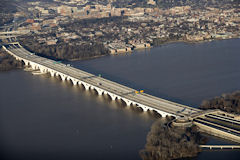
The Woodrow Wilson Bridge. Are the LeMunyon-Marsden bills a stalking horse for another Potomac crossing?
by James A. Bacon
Del. Jim LeMunyon, R-Oak Hill, and Sen. Dave Marsden, D-Burke, have introduced companion bills (HB 599 and SB 531) that would require the Commonwealth Transportation Board to evaluate “all significant transportation projects in and near the Northern Virginia Transportation District” for the purpose of providing an objective, quantitative rating for each one.
Relying upon computerized transportation simulations conducted by the Virginia Department of Transportation and/or the Northern Virginia Transportation Authority, the CTB would publicize the quantitative ratings for each project, and update its findings at least every three years, with the first report to be made no later than Jan. 1, 2013.
Each report would contain two lists of at least five projects best rated to (1) reduce congestion as quickly as possible during typically congested periods, and (2) maximize regional mobility and minimize loss of life in the event of a homeland security emergency.
Projects would include not only roads and highways but commuter rail, Bus Rapid Transit, and even additional Potomac River crossings. The lists, state the bills, “shall be used as guidance by the Board in making decisions regarding the allocation of funds.”
I have long called for such objective prioritization of transportation projects. I would amend the criteria, however, to consider the impact upon safety, which, according to the AAA, accounts for roughly three times the economic loss of congestion, upon the environment, and possibly upon economic development if a methodology could be settled upon (which I doubt it could, for reasons too complex to go into here). While an improvement over a planning process that seemingly has no objective rating criteria, these bills do not go far enough.
The Coalition for Smarter Growth sees little redeeming in the two bills at all. The smart growth organization has attacked them on the grounds that “they would centralize all transportation decisions in Richmond with unaccountable, unelected officials.” The bills, which the CSG asserts are pushed by the highway construction lobby, “would take power from elected officials in Northern Virginia who are most familiar with our transportation challenges and hand it to the … CTB. The bills are also designed to be anti-transit and to push segments of the controversial Outer Beltway.”
Moreover, notes the CSG, the bills would waste tax dollars by creating a redundant and duplicative planning and prioritization process. The Northern Virginia Transportation Authority already prepares transportation plans for Northern Virginia and updates it every five years. The NVTA’s performance standards include improving travel times, reducing delays, connecting regional activity centers, improving safety, improving air quality and moving the most people in the most cost-effective manner.
States the CSG: “The bill would apply too narrow a criteria for addressing the challenges of northern Virginia transportation.”


